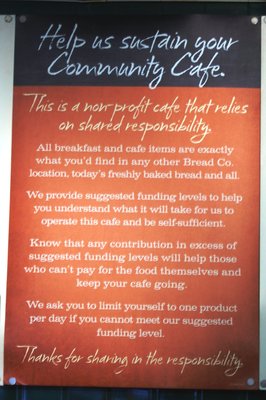The Pay-What-You-Want Panera, and Why it Works

When it comes to meeting the “suggested funding levels,” most people pay what’s on the sign. According to the Huffington Post, about 60% of the patrons are right on target, while 20% are above the remaining 20% below. The store brings in about $100,000 in revenue, with around $3-4,000 per month that is used as a training program for at-risk youth in the community. It should be noted that Panera already donates millions per year, in addition to food donations.
But the voluntary pricing plan at Panera seems to have done more than generate profits or raise money for charity, it seems to have actually raised people’s opinion of the store. The restaurant has a 4.5/5 star rating on Yelp, compared to 2.5/5 stars held by other local Paneras. The menu is no different from other Paneras, and though the location is called the St. Louis Bread Company, it shares all the standard Panera imagery and branding. But unlike the other local stores, it has dozens of reviews and pictures on Yelp. Clearly, people feel differently about this store than your average chain bagel shop.
That sense of personal investment, actually caring about the organization taking your money, is likely why the outlet has been successful despite having no set prices. In a 2010 study published in the journal Science, Uri Gneezy looked at the role altruism played in donation-only retail. His study looked at the photos sold to amusement park patrons who had just been on a ride. When the photos were offered at whatever price patrons wanted, it barely supported the company. But when patrons were told that a portion went to charity, that changed entirely. From Chemical and Engineering News:
When customers were told that half of their pay-what-you-want fee would go to charity, however, sales volume increased only 10 times […] clients paid enough so that the owners garnered a tidy profit, even after half of the revenue went to charity.
According to Gneezy, pay-what-you-want business models work when clients are offered a product they have allegiance to or when people believe they are contributing to something important or good. […] But the strategy can work […] where clients have a sense of loyalty to the product or owner, he explains.
What Gneezy observed at the amusement park seems to be acting on the pay-what-you-want Panera. So much so, that the company has opened two more locations, in Dearborn, MI and Portland, OE, with the same pricing plan. While three stores out of nearly two thousand hardly marks a trend, it is refreshing to see a company invest so seriously in a community project. And maybe the inherent goodness of people will prove a winning business strategy, bringing more pay what you want to stores.
But the real question is simple: can you write off your breakfast as a tax deduction?
(Huffington Post, Chemical and Engineering News, image via Yelp)
Have a tip we should know? tips@themarysue.com